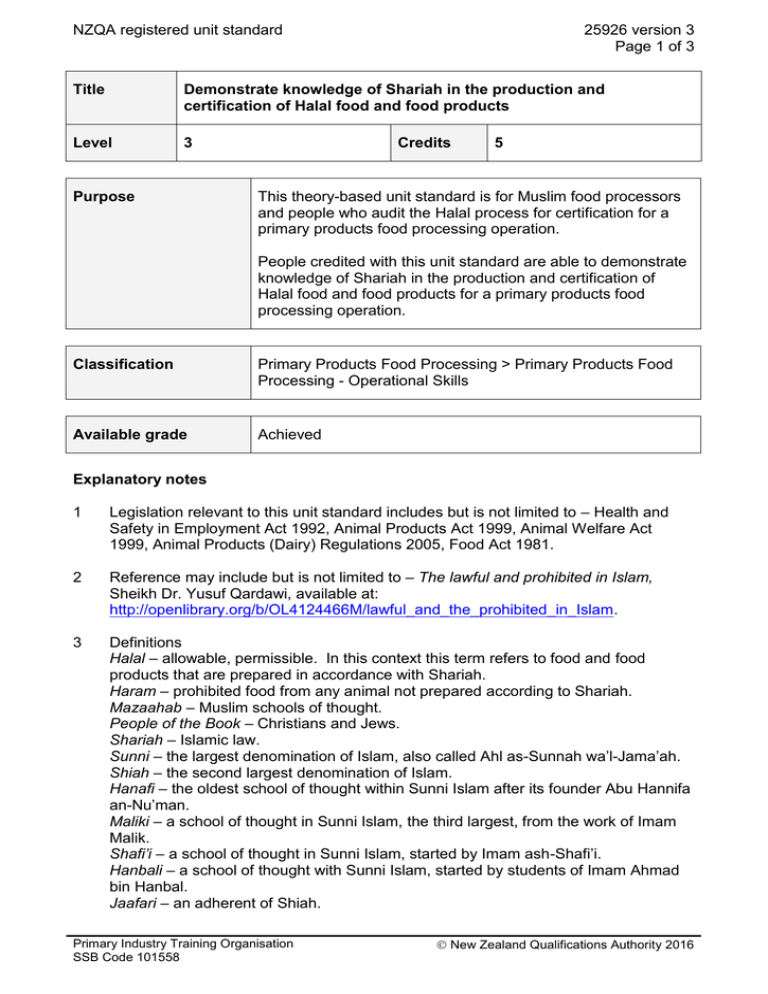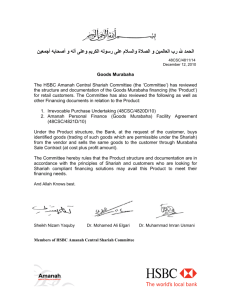NZQA registered unit standard 25926 version 3 Page 1 of 3
advertisement

NZQA registered unit standard 25926 version 3 Page 1 of 3 Title Demonstrate knowledge of Shariah in the production and certification of Halal food and food products Level 3 Purpose Credits 5 This theory-based unit standard is for Muslim food processors and people who audit the Halal process for certification for a primary products food processing operation. People credited with this unit standard are able to demonstrate knowledge of Shariah in the production and certification of Halal food and food products for a primary products food processing operation. Classification Primary Products Food Processing > Primary Products Food Processing - Operational Skills Available grade Achieved Explanatory notes 1 Legislation relevant to this unit standard includes but is not limited to – Health and Safety in Employment Act 1992, Animal Products Act 1999, Animal Welfare Act 1999, Animal Products (Dairy) Regulations 2005, Food Act 1981. 2 Reference may include but is not limited to – The lawful and prohibited in Islam, Sheikh Dr. Yusuf Qardawi, available at: http://openlibrary.org/b/OL4124466M/lawful_and_the_prohibited_in_Islam. 3 Definitions Halal – allowable, permissible. In this context this term refers to food and food products that are prepared in accordance with Shariah. Haram – prohibited food from any animal not prepared according to Shariah. Mazaahab – Muslim schools of thought. People of the Book – Christians and Jews. Shariah – Islamic law. Sunni – the largest denomination of Islam, also called Ahl as-Sunnah wa’l-Jama’ah. Shiah – the second largest denomination of Islam. Hanafi – the oldest school of thought within Sunni Islam after its founder Abu Hannifa an-Nu’man. Maliki – a school of thought in Sunni Islam, the third largest, from the work of Imam Malik. Shafi’i – a school of thought in Sunni Islam, started by Imam ash-Shafi’i. Hanbali – a school of thought with Sunni Islam, started by students of Imam Ahmad bin Hanbal. Jaafari – an adherent of Shiah. Primary Industry Training Organisation SSB Code 101558 New Zealand Qualifications Authority 2016 NZQA registered unit standard 25926 version 3 Page 2 of 3 Abadia – a form of Islam distinct from Sunni and Shiah. Quran – holy book of Islam. Hadith/Sunnah – traditions, sayings, and actions of the Prophet Mohammed, messenger of Islam. Ijmaa – consensus opinion of scholars. Mughallazah – severe filth. Mukhaffafah – light filth. Mutawassitah – medium filth. Ainiah – visible. Hukmiah – invisible. 4 Range Primary products food processing operation may include – meat processing, dairy processing, seafood or baking yeasts manufacturing. Outcomes and evidence requirements Outcome 1 Demonstrate knowledge of Shariah in the production and certification of Halal food and food products for a primary products food processing operation. Evidence requirements 1.1 Shariah is explained in terms of its origins within the Quran. Range 1.2 Shariah is explained in terms of its relationship to People of the Book. Range 1.3 includes but is not limited to – Sunni (Hanafi, Maliki, Shafi’i, Hanbali), Shiah (Jaafari), Abadia. The requirements and process for cleansing are explained in terms of Shariah. Range 1.6 includes but is not limited to – Sunni (Hanafi, Maliki, Shafi’i, Hanbali), Shiah (Jaafari), Abadia. The origins of the Mazaahab are explained in terms of their relationship to the Quran and Shariah. Range 1.5 includes but is not limited to – status of People of the Book, social tolerance, tolerance of animals slaughtered by others. The Mazaahab are described in terms of their types in accordance with Shariah. Range 1.4 includes but is not limited to – Hadith/Sunnah and Ijmaa. includes but is not limited to – mughallazah, mukhaffafah, mutawassitah (either ainiah or hukmiah). The relationship between the production and certification of food and food products and the Quran is outlined in terms of Shariah. Primary Industry Training Organisation SSB Code 101558 New Zealand Qualifications Authority 2016 NZQA registered unit standard 1.7 The effects of non-compliance with Shariah are outlined in terms of the impact on the production and certification of Halal food and food products. includes but is not limited to – cancellation of contracts, return of the product, impact on Muslim consumers. Range 1.8 25926 version 3 Page 3 of 3 Haram food is described in terms of its impact on the Halal production process. Haram food includes but is not limited to – food containing nonHalal materials, materials hazardous to health, contaminated equipment, contaminated foods or food components, animals that cannot provide Halal products. Range Planned review date 31 December 2019 Last date for assessment for superseded versions Process Version Date Last Date for Assessment Registration 1 16 October 2009 31 December 2018 Review 2 27 January 2015 N/A Revision 3 17 September 2015 N/A Consent and Moderation Requirements (CMR) reference 0033 This CMR can be accessed at http://www.nzqa.govt.nz/framework/search/index.do. Please note Providers must be granted consent to assess against standards (accredited) by NZQA, before they can report credits from assessment against unit standards or deliver courses of study leading to that assessment. Industry Training Organisations must be granted consent to assess against standards by NZQA before they can register credits from assessment against unit standards. Providers and Industry Training Organisations, which have been granted consent and which are assessing against unit standards must engage with the moderation system that applies to those standards. Requirements for consent to assess and an outline of the moderation system that applies to this standard are outlined in the Consent and Moderation Requirements (CMR). The CMR also includes useful information about special requirements for organisations wishing to develop education and training programmes, such as minimum qualifications for tutors and assessors, and special resource requirements. Comments on this unit standard Please contact the Primary Industry Training Organisation standards@primaryito.ac.nzif you wish to suggest changes to the content of this unit standard. Primary Industry Training Organisation SSB Code 101558 New Zealand Qualifications Authority 2016


